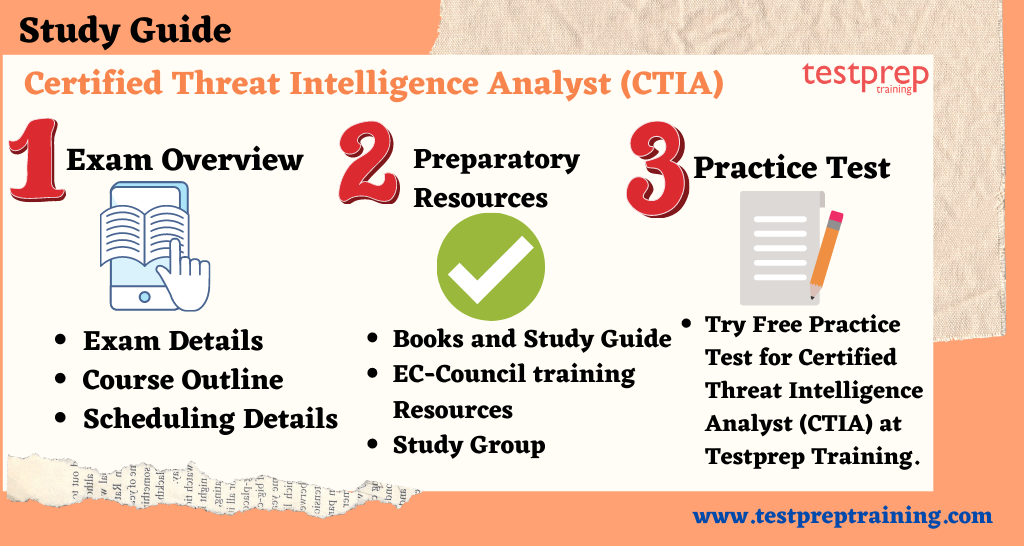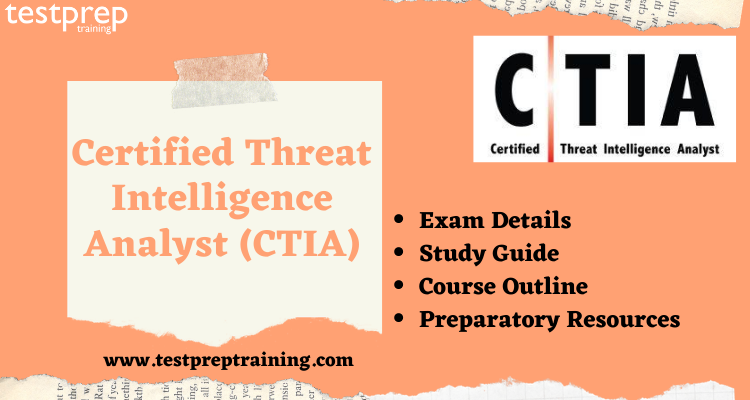The Certified Threat Intelligence Analyst (CTIA) certification is designed to validate an individual’s ability to analyze and respond to current and emerging cyber threats. The CTIA certification is not tied to any specific company, and it covers many subjects about threat intelligence. EC-Council, a company that provides cybersecurity training and certification, is the one that offers this certification.
In case, you aim to qualify the Certified Threat Intelligence Analyst (CTIA) exam, here’s we Testprep training providing you a full-fledged study guide with all the relevant information. So, let us start with the basic, Certified Threat Intelligence Analyst (CTIA) from EC-Council is a credentialing certification and training program. Not to mention, this extremely valued certification has been completely devised in collaboration with threat intelligence and cybersecurity experts worldwide to approve organizations effectively to distinguish and decrease security risks with comprehensive processing and analysis of possible threat information. Further, the CTIA is a specialist level training and certification that exhibits security experts the structured strategy to receive threat intelligence.
Certified Threat Intelligence Analyst (CTIA) Certification: Glossary
Here are some terms that may be included in the Certified Threat Intelligence Analyst (CTIA) certification glossary:
- Cyber threat: A potential or existing threat posed by a cyber actor or activity that could exploit vulnerabilities in an information system.
- Intelligence analysis: The process of collecting and analyzing information to produce intelligence that informs decision-making.
- Threat intelligence: The knowledge and insights gained from analyzing and understanding cyber threats, actors, and activities.
- Indicator of compromise (IOC): A piece of information that suggests a system has been compromised, such as a file name or network connection.
- Malware: Harmful software created to mess up, harm, or get into a computer system without permission.
- Vulnerability: A weakness or flaw in a system that can be exploited by a cyber attacker.
- Cyber threat intelligence (CTI): The information and insights gained from analyzing and understanding cyber threats, actors, and activities specifically.
- Open source intelligence (OSINT): Information that comes from sources everyone can access, like social media, news stories, and government documents.
- Dark web: A portion of the internet that is intentionally hidden and can only be accessed using special software or configurations.
- Phishing: A method employed by cyber attackers to deceive people into sharing important information or doing something, like clicking on a harmful link or downloading malicious software.
These are just a few of the terms that may be included in the CTIA certification glossary. It’s important to understand the terminology and concepts related to threat intelligence in order to be successful in the field.
Certified Threat Intelligence Analyst (CTIA) Certification: Study Guide
- Official CTIA Study Guide: EC-Council offers an official study guide that covers all the exam objectives.
- CTIA Training Course: EC-Council offers a training course that covers all the exam objectives and includes hands-on labs and exercises.
- Practice Exams: EC-Council offers practice exams that can help you evaluate your knowledge and identify areas where you need to improve.
- Books: You can also use books on threat intelligence and cybersecurity to gain a deeper understanding of the exam topics.
- Online Resources: There are many online resources, such as blogs and whitepapers, that can provide additional information and insights into threat intelligence.
Remember that hands-on experience with threat intelligence tools and techniques is also important in preparing for the CTIA exam. Consider seeking out opportunities to work on threat intelligence projects or simulations to gain practical experience.
Certified Threat Intelligence Analyst (CTIA) Certification: Exam Tips and Tricks
Here are some tips to help you prepare for and pass the Certified Threat Intelligence Analyst (CTIA) certification exam:
- Understand the exam format: The CTIA exam includes 100 multiple-choice questions that you need to finish in 2 hours. Knowing how the exam is set up and how much time you have can help you use your time wisely and complete the test at the right pace.
- Familiarize yourself with threat intelligence concepts: The CTIA exam covers a range of threat intelligence concepts, including cyber threats, intelligence analysis, and information security. Make sure you understand the terminology and concepts behind these areas.
- Study the exam blueprint: The CTIA exam blueprint provides an overview of the topics and skills that will be covered on the exam. Use it as a guide to focus your studies and ensure you’re familiar with all the areas that will be tested.
- Use study resources: You have various study materials to choose from when preparing for the CTIA exam, like books, online classes, and practice tests. It’s important to use these resources to strengthen what you know and get ready for the exam.
- Practice critical thinking: The CTIA exam requires you to apply critical thinking skills to real-world scenarios. Practice analyzing and interpreting information to make informed decisions and recommendations.
By following these tips and putting in the time and effort to study and prepare, you’ll be well-equipped to pass the CTIA certification exam and advance your career in threat intelligence. Good luck!
Must-known Skills
Let us give you a glimpse of some skills and knowledge. The candidate who is interested in taking the Certified Threat Intelligence Analyst (CTIA) exam should prepare themselves in the followings:
- Firstly, threat intelligence and core concepts
- Secondly, various types of cyber threats
- Then, kill chain methodology
- Also, requirements of threat intelligence
- Further, how to planning, direction, and review
- Next is, collecting data and processing
- In addition, data analysis
- Moreover, creating intelligence reports and disseminating
Course Outline: EC-Council Certified Threat Intelligence Analyst (CTIA)
The most significant step while equipping for such an exam is to conjecture its objectives. We are making it clear that the exam outline is the syllabus of your examination. Also, this means that the question paper will include the questions related to these objectives only. Further, the course is long and includes a variety of key modules such as introduction to threat intelligence, data analysis and cyber threats, data collection, and processing, and kill chain methodology. Subsequently, each module is discussed below in-depth guaranteeing learners obtain a firm perception of the significance of applying skills and knowledge learned to evaluate and distribute threat intelligence.
- Introduction to Threat Intelligence
- Cyber Threats and Kill Chain Methodology
- Requirements, Planning, Direction and Review
- Data Collection and Processing
- Data Analysis
- Intelligence Reporting and Dissemination
Use the EC-Council Certified Threat Intelligence Analyst (CTIA) Study Guide for better preparation!
Exam Details
Now it is time to go through some basic information about the Certified Threat Intelligence Analyst (CTIA) exam. We should start by mentioning the Certified Threat Intelligence Analyst (CTIA) exam includes 50 questions which are in the format of Multiple Choice questions which should be successfully attempted in 120 minutes i.e. 2 hours. Also, the candidate should obtain 70% in order to pass the exam. Further, the CTIA course fees for the exam is $250 USD.
Study Guide for EC-Council Certified Threat Intelligence Analyst (CTIA)

Don’t forget that the Certified Threat Intelligence Analyst (CTIA) exam is extremely interactive and inclusive in nature. So, starting with the analysis for excellent preparation for the Certified Threat Intelligence Analyst (CTIA) exam, the subsequent details are some of the critical steps that you should take to study an ideal plan for your Certified Threat Intelligence Analyst (CTIA) preparation. Let’s get started then:
Review the Exam Objectives
To be well-prepared, make sure you’re informed about all the exam details. Certification tests change because technology is always evolving. So, the first thing you should do is visit the official EC-Council website and check if your information matches what’s there. If not, make sure you know all the new exam information. Go over and really understand the objectives of the Certified Threat Intelligence Analyst (CTIA) until you’re completely confident about them. Now, let’s take a brief look at the different areas covered by EC-Council Certified Threat Intelligence Analyst (CTIA):
- Introduction to Threat Intelligence
- Cyber Threats and Kill Chain Methodology
- Requirements, Planning, Direction, and Review
- Data Collection and Processing
- Data Analysis
- Intelligence Reporting and Dissemination
Download the Exam Outline
After comprehending all the Exam Outline, it becomes apparent to download the exam Outline. Make sure you don’t skip this part. As mentioned before, the Exam Outline is the most essential part of any certification exam. Further, you can easily find the exam outline on the official website as well. Also, make sure to view if there are any important notices, you must be updated on any new changes.
EC-Council Training Program
The followings are some options for training programs for Certified Threat Intelligence Analyst (CTIA), you should consider taking one of the following:
This program is an asynchronous, self-study environment that gives EC-Council’s sought-after CTIA, Threat Intelligence training programs in a streaming video format.
For this is a live, online, instructor-led training course means you can attend the CTIA, Threat Intelligence training course with a live instructor from anywhere you want with an internet connection.
This master class grants you the opportunity to learn and understand the CTIA, Threat Intelligence program from world-class instructors, and the possibilities to collaborate with top Threat Intelligence specialists.
The “in-person” training is for Threat Intelligence so that you can get the advantages of collaborating with your colleagues and gain real-world skills, conveniently.
Join a Study Group
For passing the Certified Threat Intelligence Analyst (CTIA), the candidate needs to get and share knowledge. So, we are suggesting you join some study where you can discuss the concepts and take CTIA certification review with the people who have the same goal. This will lead the candidate throughout their preparation.
Try Practice Tests
The most crucial step is to give practice tests a try. These tests make sure that you’re ready for the real exam. Nowadays, you can find many practice tests online, so you can pick the one you like. Additionally, EC-Council recommends taking a practice test if you’re planning to get certified. Doing a practice test is a smart way to change up your study routine and make sure you do your best on the actual exam.
In addition, we at Testprep training also provide free EC-Council Certified Threat Intelligence Analyst (CTIA) practice tests for making your preparation journey easier. Give them a shot!
Tips to Remember
- Gather all the related information about the exam.
- Attempt all the essential steps of the above-mentioned study guide.
- Don’t forget to try the practice test.
- Have faith in the hard work you’re doing.
Testprep training wishes you all the very best for your exam!



